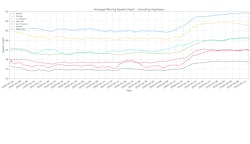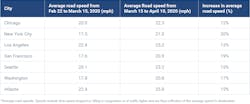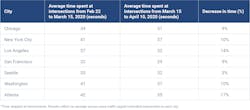Geotab highlights changes in congestion, speeds amid pandemic
Geotab recently revealed new data insights highlighting the impact of COVID-19 on commercial vehicle activity in seven major US cities.
The data, which is processed from more than 2 million Geotab connected vehicles worldwide, shows an increase in average commercial vehicle speeds and a reduction in time spent at intersections compared to averages from Feb 22 to March 15, indicating reduced congestion in these cities following regional stay-at-home orders.
“Now more than ever, commercial vehicle drivers are tasked with moving essential goods across the country to help ensure that US citizens have access to necessities like groceries, toiletries and more,” said Mike Branch, vice president of data and analytics at Geotab. “Through our analysis, we have seen a noticeable decrease in traffic congestion based on average speeds and time spent at intersections. This means that with less traffic on the roads, commercial vehicles are able to travel through typically congested major cities in a more efficient way, allowing these essential drivers to get where they are going quicker.”
According to the analysis, the US city with the largest increase in average road speeds is New York City, moving from an average speed of 17.5 mph to 21.0 mph—a 20% increase. San Francisco and Washington DC had the second largest increase in average road speeds.
In addition to average road speed, the analysis also examined the average time stopped at city intersections after March 15 compared to average times from Feb 22 to March 15. The city with the largest reduction in time spent at intersections was Atlanta at 17%, with an average of 35 seconds spent at an intersection compared to 42 seconds before March 15. The city that has shown the smallest reduction in time spent at intersections is Seattle, with a 3% difference since before March 15.
“Examining connected car datasets at the city level helps provide some clarity and understanding about what is happening in our communities during unprecedented times such as this,” Branch added. “As citizens across both the US and the world continue to stay home, our support for frontline essential workers continues to be of the utmost importance.”
To learn more about Geotab’s key COVID-19 data insights, visit geotab.com/blog/congestion-and-commercial-traffic.


